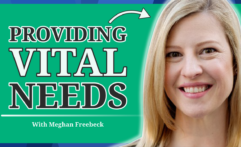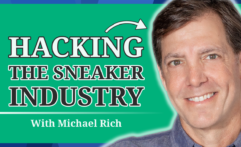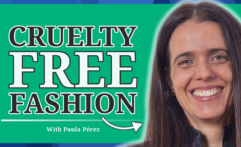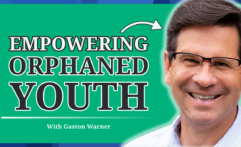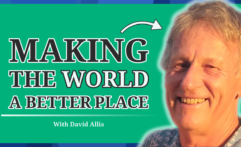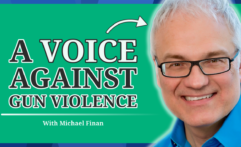How to Ensure the Co-existence of Elephants & People: Dr. Michelle Henley from Elephants Alive (#4)
Affiliate Disclosure
Hey fellow impactful ninja ?
You may have noticed that Impactful Ninja is all about providing helpful information to make a positive impact on the world and society. And that we love to link back to where we found all the information for each of our posts.
Most of these links are informational-based for you to check out their primary sources with one click.
But some of these links are so-called "affiliate links" to products that we recommend.
Why do we add these product links?
First and foremost, because we believe that they add value to you. For example, when we wrote a post about the environmental impact of long showers, we came across an EPA recommendation to use WaterSense showerheads. So we linked to where you can find them. Or, for many of our posts, we also link to our favorite books on that topic so that you can get a much more holistic overview than one single blog post could provide.
And when there is an affiliate program for these products, we sign up for it. For example, as Amazon Associates, we earn from qualifying purchases.
What do these affiliate links mean for you?
First, and most importantly, we still only recommend products that we believe add value for you.
When you buy something through one of our affiliate links, we may earn a small commission - but at no additional costs to you.
And when you buy something through a link that is not an affiliate link, we won’t receive any commission but we’ll still be happy to have helped you.
What do these affiliate links mean for us?
When we find products that we believe add value to you and the seller has an affiliate program, we sign up for it.
When you buy something through one of our affiliate links, we may earn a small commission (at no extra costs to you).
And at this point in time, all money is reinvested in sharing the most helpful content with you. This includes all operating costs for running this site and the content creation itself.
What does this mean for me personally?
You may have noticed by the way Impactful Ninja is operated that money is not the driving factor behind it. It is a passion project of mine and I love to share helpful information with you to make a positive impact on the world and society. However, it's a project in that I invest a lot of time and also quite some money.
Eventually, my dream is to one day turn this passion project into my full-time job and provide even more helpful information. But that's still a long time to go.
Stay impactful,
Have you ever wondered what could be done not just to protect elephants, but to enable elephants and people live together in harmony? Well, then you’ll enjoy our conversation with Dr. Michelle Henley from Elephants Alive!
“Elephants touch every single discipline. They touch economics, ecology, climate change, all these things. And because these are big problems, which they call wicked problems, you need a trans-disciplinary approach to try and solve some of these problems. You can’t go it on your own, and that’s why collaborations are absolutely vital when it comes to studying elephants. And I think we can achieve more and we need to achieve more as a collective network of caring.”
Dr. Michelle Henley, Elephants Alive
Three Key Points From This Episode
How Michelle’s life-long passion for elephants led her to co-found an elephant charity…
What the mission of Elephants Alive is and what some of their concrete project are…
Why collaboration among charities is key…
About Dr. Michelle Henley

Michelle holds a PhD, from the University of the Witwatersrand in Johannesburg, is a Post-doctoral Fellow at the Applied Behavioural Ecology and Environmental Research Unit of the University of South Africa, Trustee of the Elephant Specialist Advisory Group of South Africa and Elephants for Africa. She has been studying elephants for 25 years, and has adopted an interdisciplinary approach, skillfully combining scientific research with education and awareness-raising. In addition, she has published more than 50 peer-reviewed scientific publications and contributed to numerous books.
About Elephants Alive
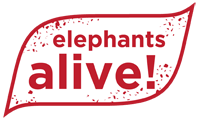
Since 1998, Elephants Alive have been studying and protecting southern Africa’s elephants. Their mission is to ensure the survival of elephants and their habitats, and to promote the harmonious co-existence of elephants and people. And their work and sphere of influence continues to expand west of Kruger and across borders North into Zimbabwe and East Mozambique.
Links and Additional Information Discussed
Check out Elephants Alive and their work and various projects, their scientific publications, as well as how you could best support them
Follow along the journey and impact of Elephants Alive through the lens of their social accounts, including Facebook, Twitter, Instagram, and YouTube
As a charity, reach out to Elephants Alive directly and collaborate together, similar to some of their “Elephant Champions“
The Full Transcript
Dennis: Hello, and welcome to the impactful ninja. So I’m your host, Dennis Kamprad, and today, we are joined by doctor Michelle Henley from Elephants Alife. Michelle, welcome.
Michelle: Thank you. I’m very pleased to be here.
Dennis: Awesome. We’re super happy super happy having you as well. Now before we go into your into your journey and the amazing work that you do. Give us a brief introduction. What is elephants alive and what are you doing there?
Michelle: So Elephants Alive is a South African based NGO, and we actually work wherever the elephants lead us. So I really love that idea that our study site is defined by where elephants go. And our mission is to promote the survival of elephants and also their habitat. So we’re not only focused on elephants, but the spaces they occupy. And very importantly, to ensure hormone hormoneous coexistence between elephants and people because there’s more and more conflict developing between the two species.
Dennis: So, basically, helping elephants survive, but then also helping improve the habitats and all the area they live in at the same time.
Michelle: And promote, spices where elephants and people need to share the landscape. And that’s often outside of protected areas.
Dennis: Oh, wow. That’s super super curious already, like, going a little deeper, but let Go all the way back now before you started elephants alive. What were you doing?
Michelle: So I always knew since I was 5 years old, then I want to work in nature and be immersed in nature and be protecting our wonderful surroundings. And so I went on a journey to qualify myself because at the time that I wanted to enter the conservation world, it wasn’t a popular career for women to be in. And I knew for me to occupy that space, I had to really qualify myself in ecology because I love the connection between species and the whole environment, which is what ecology offers. And so I went to university to study for 12 years to get a doctor’s degree, and to Henley develop my interest with elephants. And that’s how the journey actually started.
Dennis: Oh, wow. That’s quite a quite a deep passion from a young age. And then really going basically learning all about it and doing the doctors 12 years is quite a long to Korea as well.
Michelle: Yes. It is. And I think because elephants are very social animals, I knew I wanted to fight is on a social species. So for me, it would have either been primates mongoose because they’re very social animals or elephants, but within our family, we’ve always had a very deep passion for elephants. So in a way, our new elephants were gonna win in the end, and I’ve never regretted that.
Dennis: So was the deep passion that you had for elephants just kind of being close to them when you were growing up and being fascinated by the elements, or did it also crawl by some some issues that you saw and that you wanted to overcome with your work.
Michelle: It’s probably a combination of those. So I I mean, as a typical South African family, we regularly went to the Krieger National Park. I think for any child seeing an elephant real life for the first time, it’s something that sticks in your mind. And in my case, Henley inspired me to study for that longer period to be able to work with them. And also, you know, realizing that this is a challenge to share our beautiful planet with a species as big as an elephant that competes with the same resources as us, they’re gonna need people to, in a way, back them up and study them. So put the the science on the table, but also the passion and the privilege that we have to share this world with elephants. So I knew it was gonna be a challenge. But our I’ve always felt a real connection to elephants because they’re such compassionate species. They’re empathetic with each other and they do amazing things for the ecosystem. So once I made up that decision, when I was about sixteen years old, I started working towards that point.
Dennis: Oh, wow. And let’s fast forward from when you were sixteen year old to once you finished your your studies and also your doctor. Did you directly afterwards go into the field and say, well, let’s start a let’s start a charity to help elephants. Let’s start elephants alive, or did you take any intermediary steps until that point?
Michelle: So there were intermediate steps. My mother is an artist. So in 1996, we started drawing fint ear patterns. You know, after as a family, we read Ian Douglas Hamilton’s book books, Jane Goodall books, Diane Forsy’s books. And I knew this was the that I wanted to live, protecting animals, but with a scientific background and also then keen observation Henley and living on the ground with that species. So being in their same habitat and for fun, my mother and I started drawing elephant ear patterns to recognize individuals. And we sort of became addicted to that. So because it’s like a bit of a bush soap opera when you can start understanding the social dynamics of elephants because you can identify different individuals. And so it was fun to see if particular elephants would meet up with other elephants at certain times. And at the same time that this was happening, I was busy doing my fieldwork for my PhD, which was looking at the feeding distinctions between bulls and cows and how I feed differently based on body size differences. And during that period, the founder of Kaye. She was also one of the land owners in the study area that I was working, and she got to speak to Ian about these ear patterns that my mother and I had generated. And when Ian, Douglas Hamilton, who also had done a long term study on individually recognizing the Munoz population. When he saw the ear patterns, he’s he basically encouraged Moline to attack me and to start an elephant project in the Timber Varty private nature reserve. So that’s where it all began. It was my passion together with my mother also loves elephants and who is an artist that converged with, the founder, Moline McKay’s intro in the work that we were doing together with Ian Douglas Hamilton, and that’s where the NGO was born.
Dennis: Oh, wow. It seems like Basically, from the beginning, our journey there was all leading up to professionally helping elephants and their surroundings. One question for the funding part So you mentioned, you started a project together with the other two people. Was that like the concrete first step also in getting elephants a life started? And the other 2 people are there, your co founders for the security team.
Michelle: Yeah. So they’re the founders and I’m the co founder because, Moline McKay had this vision of growing up with a little elephants and playing with a little elephant when she was a child. So she she knew she had a connection with elephants, And then when she saw me present my PhD results at a Timber Varty committee meeting, because she was on the committee, she contacted Ian and then they reached out to me and said, let’s let’s burst this project now. And that’s where it all started. So that basically we started out where I kept on identifying elephants, Ian and Molly fitted collars to elephants tracking policy elephants in 1998. So we’ve been tracking elephants for 25 years, and the ID study identifying elephants has actually been going for 27 years.
Dennis: And when you say the first project that you did together, how did How did you get that that one off ground? How did you get started there? And did you already reach out to to other people to support your your charity at this point in time, or did that just happen afterwards?
Michelle: So Maureen McKay managed to build a tiny little office and gave us the first vehicle that we could use to do our field work. And Ian, obviously, with Save, the elephants having all those years of experience of tracking elephants was the adviser, the scientific adviser on how we would take things forward. But you know, I obviously had to fundraise to keep the charity going. And also we started to develop different projects that weren’t just based on tracking elephants and identifying elephants. So I started getting, you know, once I was qualified with my PhD, I could start getting students involved. And for instance, Robert Cook, who’s been with us now for 10 years. He started with us, started a project where we used bees to protect iconic trees because in South Africa, that’s quite a burning conservation issue. And so we’ve also more projects where we reach out to the community because, as I said, in our mission statement, we’re very interested in fostering co existence values between people and elephants. And in South Africa, there’s a lot of communities that live outside of protected areas, and it’s really important to engage with those communities and, work together with them. That the value of these protected areas can be elevated. And also as most elephants actually live outside of protected areas, so 57% of elephants live outside of protected areas, and 76 percent of elephants in Africa actually move across national boundaries. So between countries, I knew that when embarking on this elephant journey, we weren’t just gonna be staying within South Africa. And as soon as we saw elephants moving between detected areas, a whole new project was burst, which is the corridor project, which is protecting these vital linkages between protected areas. So that’s And in those corridor areas, it’s really important to foster co existence values with people because often their crops are affected by people. But having these corridors linking protected areas, you allow elephants their freedom to move over the bigger areas that they need to. And at the same time, protect people’s livelihood and safety in the process because this is vital for biodiversity
Dennis: That’s quite a few few things that you already mentioned on on your journey. So, basically, when you started 25 years ago, initially, we’re just tracking elephants, then develop with more and more projects until helping elephants and, well, cross countries and with these corridors as well. If you had to kind of if, like, a brief journey, how elephants are left developed in the last 25 years? How do how did it go roughly?
Michelle: Well, as it’s sort of grew organically like most NGOs do that are founded on a lot of raw passion, but what I really like about working in the NGO space is that this opportunity to let the animal because of your familiarity and working on the ground, let the animal define where you should be focusing your attention or what you should be focusing your attention on. And so if I can speak about another project that’s really to my heart that also developed organically was an incident with one of my staff members where we had an elephant that we have followed for many years over 20 years. His name was Matombu, and he actually ended up becoming blind in the latter part of his life. I think because he was mind, he really maybe had a different perception about us as observers compared to the other elephants. So he would contact rumble when he heard our vehicle coming and walkovers if he acknowledged us as one of his companions. And this this became very touching — an emotive to everybody working for elephants alive. And at one stage, he he developed a very severe injury, so we’re not sure if he got into a fight with another bull, but we are to treating with the vets. So we got permission from the reserves to keep on treating him so that he could recover. And in that pro says one of my staff members went home to their village, and they said they spoke to their grandmother about how concerned they were about my tomb with the elephant. And sorry to their mother. And their mother was so concerned about this elephant, even though she had never met — but Tambo, even though she very rarely had got into the protected areas because of our electric fences and our separation of wildlife and people, often people that live on the borders of these protected areas, even though they 16 kilometers away from visiting the park. They don’t have transport or they don’t have the funds to enjoy that part of wildlife. So when Joel came back and he mentioned how, his mother was asking him every day how this elephants recovering it it just ignited something in my heart that we need to bring grandmothers and mothers from the community and introduce them to elephants. And that was the birthing place of the unlawful Google program, which means elephant grandmother. And when you bring these gracious, beautiful women into the conservation space, and you introduce them to breeding herds of elephants where you also see the oldest elephant leading the family, the matriarch, It immediately resonates with him. So they can immediately see the leadership role that that female elephant has within your family and all the responsibility because culturally, these grandmothers or goggles are the backbone of society. They left to look after the grandchildren. And on average, they have 8 grandchildren, sometimes up to 25 grandchildren. So by reigniting that servation, passion in the grandmothers, you immediately have a ripple effect in terms of your conservation value to the community. So, we’ve invested quite a lot in the blow for Google program, and it’s it’s really a very important program, I think, because it’s connecting people 2 elephants across boundaries. So if that’s an electric fence, if it’s a political boundary, and that’s what we stand for. That’s just one of the the projects that have morphed into something quite big from one particular incident that can be traced back to a blind elephant pool called Montangou.
Dennis: That’s a very, very touching story in starting with a blind elephant. And then Henley, as you as you mentioned before and that the elephant guide, your your actions, taking into account like all the, well, basically all the effects that had on not just the elephants and how they behave with you. But then also on the community and in the end helping you to get the community much, much more closely involved.
Michelle: Yes. Yes. And That particular bill, I remember when we took, one grandmother on our tracking day, and we also camp with the grandmothers in the bush. There was a granny that was almost blind, and we were explaining to her that this bull is also almost blind. And she was straining to look at him, and then he because he’s blind, he walked into a tree when he crossed the road, and she was so startled and affected by that. And she could under she could see an elephant through different lenses, so speak because she could identify with that elephant. And that’s the same with these wonderful grandmothers who have all the knowledge of the small plant values that are out there. They know how to live with the land. Then they the primary educators of the next generation and so I just feel inspiring these grandmothers is critical in terms of letting it have a ripple effect throughout the community to foster of those values of living close to nature and in harmony because a lot of that said is being lost as people urbanize and also as culture changes and cultural values change. You know, I don’t think the youth sit at the feet of the grandmothers anymore and listen to their stories. It’s much easier to look at your YouTube, but a lot is lost in that process. And I think connecting grandmothers and grandchildren to of values where you live close to the earth, it’s really important for conservation today because in that interface where elephants or connecting protected areas along corridors, that’s where we need to maintain these values. If those corridors become urbanized, then all that connectivity across a larger landscape is lost. And at the end of the day, elephants won’t enjoy the freedom that they entitled to.
Dennis: Sounds as you have, like, a very, very unique approach in in how you’re doing these projects and how you’re helping elephants in the community based on the one hand of your scientific background, but on the other hand, also having a really close look and letting yourself guide by the communities, by the animals. It’s kind of this classical like, the the art and the science of while doing something in this case.
Michelle: Yeah. I think that’s really important. I do think that Science has a lot of answers, but it doesn’t have all the answers. I think you need a lot of heart when you’re dealing with 2 species that are very ful, elephants are powerful because they’re so big and they’ve got big appetites and they need to cover large area of land. And, obviously, we know how powerful humans are. And if you look at their history, elephants have declined in the past 100 years by 97% approximately 97%. And over that same time period, we have increased by 387%. So elephants naturally are being Kamprad and kept into smaller and smaller areas of land. And it’s only good will that’s going to allow us to coexist peacefully. And that’s that to me is more philosophical endeavor than what it is a scientific endeavor. And, you know, if you look at the African culture that known as Ubuntu, it’s that respect that you have for everything around you. In other words, you it’s a realization that I am because you are And I think if that starts working both ways between elephants and people, then we’ll be moving together in this harmonia space, which is really very critical to conservation today.
Dennis: Well, let’s take a quick step back into basically how you how you manage to make it all work. When it comes to charities, one of the big part is also the the fundraising part to continue operating, to continue helping elephants in this case, helping society, with the protection of elephants and moving the inclusion of, well, everyone around them as well. When it comes to the journey of fundraising for your organization, how did you get started here at the very beginning to spread the and and how did you progress there all the time?
Michelle: Fundraising is critical. I mean, you can have a lot of passion, but you do need the money to execute the dream. And this is where the funders come in and we’re very grateful. So I started learning and teaching myself sometimes through hard experience, to write funding grants that I could send off to organizations like the US Fish And Wildlife Services, is fun. So organizations that can understand the long term vision and not just provide short term funding because it’s also important especially when you’re dealing with community to have continuity in your funding. You can’t, for instance, go and address the safety issues of people living in a corridor where elephants are crop riding their food, or they may be scared to walk around at night just for 1 year, and then you disappear. You have to consistently be there to show that you care. It’s almost like a, you know, like in a elephant family, the safety of the younger elephants are maintained by a lion long bonds. And I think when you’re dealing with a community, you need to consistently, for multiple years, show that you care, and you need multiple funding then. So I’ve worked really hard to learn how to fundraise. I didn’t study it, and that was probably one of the the most important skills that I’ve learned in this journey is to be able to fundraise but also I think there’s a lot of goodwill in private people that it’s actually very enriching to reward that passion that people have that they want to contribute to a good cause. So for instance, we do allow people to join us when we call our elephants, and it’s life changing for some people to be able to feel the heart breath of an elephant or to it snoring while you’re fitting a collar on or to smell its breath like grated carrots or whatever it is to feel our hairy. They actually are. And that’s also been great that we’ve had wonderful individuals that want to experience that, and then we’ll fund the caller because colors are very expensive to be able to track these elephants over a 4 year period if you’re getting data every hour, but it’s been — possible approach. We’re having the big grants that support cool funding and then having the more individual people that are prepared to fund particular things where they can connect to elephants or connect to large trees or connect to bees, which were used to protect large trees, for instance. So there’s many or even to support grandmothers because their portraits are so beautiful when you’ve got, for instance, there’s another NGO that we collaborate with where it’s taking unemployed youth in communities, and they come and take photographs of these interactions between grandmothers and elephants, and they called wild shots outreach. But it’s connecting the dots. And that’s, I think, as a life lesson, that’s one of the biggest things that I’ve learned from elephants who are my teachers, and that’s that you are what you are because of your community and because of the the strength of all these dots that you connect. And that’s why I think in terms of fundraising, unfortunately, I think some NGOs funders from particular NGOs where I would rather like to see it as we’re all working together for good. And let’s try and find the connections between us and, you know, one NGO when you’re dealing with complex issues that elephants unearth because they move over such large areas, you’re dealing with wicked problems that you can only solve if we work together. We 1 in 1 NGO might have a strength in terms of leveraging corporate funding, where another NGO might be good at leveraging grant money. But if we work together, then we can address the same issue, but from different angles. And I think more of that needs to happen in the conservation space.
Dennis: So many beautiful points to unpack here as well. Like on the one hand side, you’re all working towards a good cause. You all wanted to change something for, for the positive. So it sounds like it’s just net to to also work together and instead of seeing yourself, like, other organizations competition to see each other as collaborators. And then when it comes to the funding itself, there’s a big part on the on the funding for more like long term project that happens with with grants or with other organizations that help you, but then also there the individual part. And I think there’s quite a unique concept that you’re having, at least what you what you mentioned already. Is that if I were as an individual would like to support you, it’s not just that I’m writing a blank check, and I have no idea what happens, but I could So partly specific calls like a color or like like one of the other things that you mentioned. That’s a great transition also to before we go a little deep in some of the challenge as well on the way, for a few hours to to have a look. Basically, if I wanted to to support you, what would be my best way as an individual to support elephants alive and your work that you’re doing?
Michelle: Well, I mean, the first approach, and that’s the classic approach, is basically following us on social media. So subscribing to our Facebook page and Twitter and Instagram and LinkedIn. So you can see what we’re doing and maybe get exposed to all avenues in which you can support us, whether that’s supporting a beehive project in Mozambique, in the corridors where elephants are moving because you know it’s protecting people’s crops. Whether that’s supporting elephant shepherds, which are people that we employ to inform the community that an elephant’s gonna crop ride and also frighten the elephants away at night in non lethal ways because that’s important for people to protect their livelihoods or whether it’s even another NGO that decides, okay, if I join hands with you and I write a grant together with you, then both of us have twice a better chance of actually securing that grant and not just trying to always, as I said, see other Angios’ competition because I do believe, and this is what I find exciting about follow, studying elephants. Is elephants touch every single discipline. They touch economics, ecology, climate change, all these things. And because these are big problems, which they call wicked problems, you need a trans disciplinary approach to try and solve some of these problems. You can’t go it on your own, and that’s why I think this this connecting and collaborations absolutely vital when it comes to studying elephants. And I think we can achieve more and we need to achieve more as a collective network of caring. So if there’s an individual donor that wants to support us with funds or for a particular project. That’s absolutely fantastic. But what they need to know, which I think is exciting is they then become part of our herd part of our family of people that are supporting elephants. They’re not gonna be alone in that mission, and we’ll introduce them to the network that’s supporting us.
Dennis: That’s beautiful. So it’s basically two, two big buckets that I was seeing, like, one for individuals. Please do follow on the social have a look what elephants alive are doing. The great work, we’ll put all your associates into the show notes as well. Check out the the websites as well. Have a look which specific projects, for example, you would like to contribute to, just in in general, and stand for organizations as well when, when you think about the work that you’re doing, the work that Elephants Life is doing, you have one happy collaborator with Elephants Alive. And if you have some over with the work. I hear that you would be super happy to to have organizations reaching out to you and seeing how you could collaborate, towards some more positive impact that you could have together.
Michelle: Fantastic. Yes. And, you know, to know that if somebody wants to support us financially, that we can explain to you how your contribution are ever big or however small, how it fits into this network of good to help an amazing species that needs a lot of freedom if we want to protect and maintain the essence of what elephants are. And that is really large animals with a large appetite that need — huge spaces. I mean, you can put an elephant in a zoo, but that is a poorer life for an elephant. We we wanna protect the values and the essence of elephants while the elephants. And even if that means that we’ve gotta link people in different countries, which is another exciting thing that elephants have done. They’ve actually introduced me to colleagues that we now have in Mozambique that I never knew it. And it’s just because I was following the elephants that I got introduced to all these amazing people that are also trying to make a difference on the ground. And I think if we follow the the value system of elephants, we’re going to make a better world because they lure the young male, lay down their life for a young elephant. That’s probably something that comes instinctively to the cows within family units, and they also revere the old. So in elephant society, the older you get the more respected you are because they’ve got a very long life of learning. So they’ve born with only 35% of adult brain capacity, which means where most mammals are born with 99% of the adult brain capacity, which means they’ve got a long life in which they need to learn how to become an elephant, and they depend on all the individuals within the social structure to teach them the way of becoming an elephant. And that’s why we’ve Also, imitated that value system with our unlawful Google program. We believe these older grandmothers have the wisdom to teach us what are good morals? How should we look after the land if we wanted to produce food? Do we have to be frightened when we know an elephant crossing that land at night and not meaning any harm, but just trying to move between protected areas. Those are all things that are captured in older people. And also in elephant society. And I think we’ve got a lot to learn if we just mimic the value of elephants on a moral sense as well.
Dennis: Beautiful. That’s also, great transition already nearly to the next part about all the learnings that you talk away and, things that you can also share with us before we jump into that part, is there anything about elephants alive that you would have liked to talk that that I didn’t ask you that didn’t get a chance yet?
Michelle: No. Not at this stage. Maybe something will come to me a bit later.
Dennis: We could share it anyway in in our show notes. And now let’s Let’s jump to the next part. When you reflect on all the work that you’ve been doing with with elephants and with elephants alive, basically since since you started as a as a kid, how has that impacted your your personal life so far?
Michelle: Well, a lot because elephants all my life. So in long hours often of dedication, but you don’t count them because it’s it’s raw passions, and it’s not a job. It’s a calling. It’s something you can’t walk away from, even if there’s challenges because you’ve gotta see it through. So I think that’s one of the things is that it’s been a lifelong commitment for me. I mean, this is 27 years of actively doing research on elephants, but having a life or elephants basically since I was five years old and knowing that I want to work with a social species. So I think it’s that consistent connection with elephants that has steered my path in life. And I think every decision that I take or every opportunity that I see, I always try and bring it back to elephants and how we can improve what elephants represents because I feel that’s an absolute privilege that in this day and age where there’s so much urban organization where there’s so much emphasis on economics and ambition and all those things that we actually can share the planet with an animal, like an is almost a miracle, I would say.
Dennis: I’ve seen them alive in in Kenya when I was there, and it’s just just beautiful. Now I just want to say also deeply connect with with what you share chest about, did you spending all your time thinking about and working with working for for elephants, and it doesn’t feel like work. It feels like a passionate That’s quite similar to to what I’m doing with Impact for Ninja as well. Make it view view all of this as like, let’s let’s enable more people to make a positive impact as well. And none of the so far has had, like, work. So I really loved that, well, that connection there as well.
Michelle: Right. That’s wonderful that you feel that because I think, you know, there’s always long hours. There’s always challenges. There’s always obstacles. But if it’s a calling, you don’t look that you look at what you want to achieve and actually the privilege that you have to try and unlock a wonderful course in me people along, you know, when you’re walking this journey, I think that’s very important.
Dennis: And that’s also the perfect transition to our final question. If you had to share one tip of our audience to become more impactful, what would that one tip be?
Michelle: To stay inspired to remain curious about how wonderful nature is and to realize that if we don’t seed with protecting elephants. There’s very little hope for all the other smaller, less charismatic animals that share the landscape with elephants. So I think to really connect to what elephants represents, not only for me as a scientist, but also on a philosophical level and these values of Ubuntu that we are because die all and really hold that space of what a privilege it is to share the world with elephants today.
Dennis: Well, Michelle, thanks so much for sharing your journey, sharing everything that you’re doing with elephants alive. We show all the best and continued success And, well, thanks so much for sharing that with us.
Michelle: Thank you. And I hope you’ll come and visit us, and we can spend some time in the company of these gentle giants.
Dennis: I would love to. And to everyone else. Thanks so much for joining us today as well, and stay impactful.

